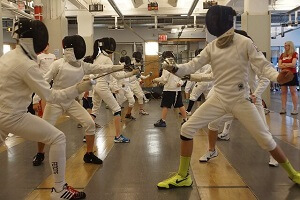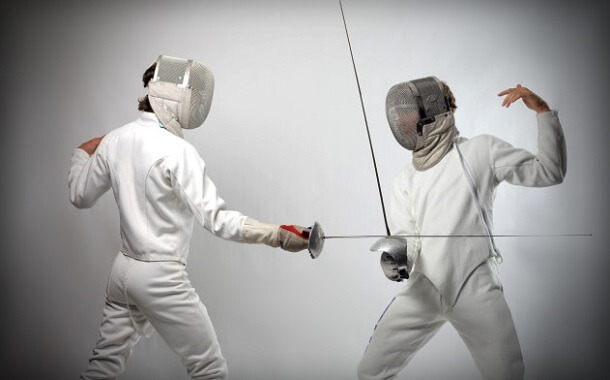How Much Do Fencing Lessons Cost?
Last Updated on January 23, 2024
Written by CPA Alec Pow | Content Reviewed by ![]() CFA Alexander Popinker
CFA Alexander Popinker
As an iconic sword-wielding sport combining athleticism, strategy, and precision, fencing captivates participants of all ages. If you’re intrigued to try this fast-paced game of wit and reflexes, understanding fencing lesson pricing helps set expectations.
This article will overview what to expect from classes, average lesson rates, additional costs like gear and club memberships, tips for saving money as a beginner, and what level of commitment makes advancing in competitive fencing worthwhile. Read on before en garde-ing into this exciting hobby!
How Much Do Fencing Lessons Cost?
For beginners, fencing classes cost between $15 to $50 per session, with the option of renting gear for an additional cost, usually starting at $10 or more. Intermediate and advanced fencing lessons tend to be priced at $50 or more per class, and students may eventually need to invest in their equipment, adding to the overall cost.
Beginner recreational lessons focusing on fundamentals using plastic practice swords often start around $15 per person in a small group class, $25 for 45–60-minute semi-private lessons, up to $50+ per hour session for one-on-one coaching. Community center programs offer the most affordable group options under $20.
Intermediate classes strengthening core skills before progressing to electric equipment see similar pricing, ranging from $20 per 1.5-hour intermediate group class to $30-45 per intermediate private lesson.
Once electric equipment is introduced for competition preparation, intermediate and advanced training jumps to $50-75 per 1.5-2-hour group lesson using epees, foils, or sabers. Expect at least $60 per private session.
The most elite competitive clinics cost $100+ per session for intensive conditioning and bout training under master-level instructors. Travel expenses to top programs add up too.
Academy of Fencing Masters offers private lessons for $120 to $200 per hour, with the cost varying based on the level of the fencer.
FencingNYFA offers a range of packages and rates for fencing lessons to cater to different levels of expertise and commitment. They provide an “INTRO 4” package, consisting of 4 Beginner Private Lessons for $200, and an “INTRO 8” package with 8 Beginner Private Lessons for $400, ideal for newcomers.
For adults, there’s the option of the “ADULT PACKAGE,” which includes 1 class and 1 lesson weekly at a rate of $840, or the “ADULT CLASS ONLY PACKAGE” with 1 class weekly for $450. For those looking for more advanced training, the “ADVANCED ELITE” package offers 2 classes, 3 lessons, and 2 free condition classes weekly, priced at $2,440.
San Diego Fencing Center offers U.S. Fencing memberships for non-competitive fencers at $10 per fencing season and competitive fencers at $75 per fencing season.
The Art and Sport of Fencing
Modern fencing traces back over 700 years, though swordplay itself spans antiquity. Today’s sport features three disciplines:
- Foil – Light, flexible blades targeting the torso. Points scored with tips.
- Epee – Heavier blades for targeting the entire body.
- Sabre – Light blades for slashing attacks above the waist.
Students first learn proper footwork and rules then integrate strategy, mastery of form, and mental discipline through lessons and bouts.
Benefits of fencing include:
- Full-body conditioning and mobility
- Enhanced coordination and reflexes
- Quick strategic thinking and problem solving
- The thrill of friendly competition
Factors Affecting the Cost of Fencing Lessons
Prices for fencing coaching depend on:
- Lesson Format – Private, partner, and group sizes available
- Instructor Expertise – Beginner vs. competitive expertise
- Program Type – Recreational clubs differ from academies grooming elite fencers
- Location – Coaching rates and facility overhead both impact pricing
Generally, introductory recreational fencing costs between $15-$50 per lesson on average. Competitive training runs $60-$150+ at high-level clubs.
Extra Fencing Gear and Activity Fees
Beyond instructional tuition, factor in costs like:
Basic Equipment Rental – Usually $10+ per session for starter epee or sabre sets. Bring your own athletic wear.
Membership Fees – $30-150 per month at many clubs. Sometimes waived for new students or included with lesson packages. Covers overhead costs and facility usage for members’ open bouting times.
You might also like our articles on the cost of golf lessons, archery lessons, or boxing lessons.
Tournament Entry Fees – Local competitions run $40+ just to participate in one event per weapons style. Travel tournaments cost much more between lodging, food, gas airfare, etc. Qualifying for international competition means even higher expenses.
Tips For Affordable Fencing as a Beginner
Ways to save money as a new fencer:
- Start in community center or local college recreation classes under $20 per lesson;
- Consider used starter equipment bundles from other fencers for $100-$150 instead of buying brand new;
- Inquire about lesson package deals for signing up for 8-12 weeks of committed classes upfront;
- Partner with a friend for semi-private lessons to split costs.
Once committed to regular training, joining a club makes progressing easier through their facilities, open bouting times, and member events.
Choosing the Right Fencing Club and Coaches
 With many options available, select fencing programs based on:
With many options available, select fencing programs based on:
- Depth of beginner fundamentals focus
- Instructor experience and teaching approach
- Competitive focus matching your goals
- Training environment feels welcoming
Ideally find supportive coaches truly invested in developing each unique fencer through personalized feedback, attentiveness during lessons, and respect.
Consider convenient location and class schedules too. Progress requires consistency only possible if sessions actually work with your lifestyle realistically.
Financial Assistance for Aspiring Fencers
If seeking intensive competitive training, some options to ease costs include:
- Local community and diversity outreach programs specifically for fencing through grants, donors and partnerships with regional clubs
- Junior Olympics organizations in some areas offer need-based funding for young talent
- Sports scholarships at high schools or universities for standout fencers meeting academic requirements
- Sponsorships from individuals or companies may cover equipment and travel costs in exchange for promoting brands as a competitive athlete
Is Fencing Right for You?
At its core, fencing provides physical activity promoting quick thinking and technical prowess through kinetic chess matches of skill and daring. Have realistic expectations before spending on lessons or equipment.
Casual beginners renting basic gear just need fitness clothes and $100-200 to sample this graceful combat sport through group lessons and see if it sparks passion worth sustaining.
For those striving toward competitive excellence, be ready to commit at least 2-3 lessons weekly for concentrated technique refinement – $400+ monthly. Budget for transportation time and private tournament costs too. Gear expenses can wait months as skills solidify.
Ultimately fencing rewards diligent students with lifelong athleticism, concrete self-defense capabilities, and unparalleled thrill during bouts…plus wielding swords! Determine your goals, find quality coaching that fits your needs and budget, then enjoy the pride and confidence fencing imparts over time.
Frequently Asked Questions
What makes fencing difficult?
Mastering fencing requires learning intricate footwork, bladework, distance control, and split-second decision-making simultaneously. The difficult yet rewarding skills needed include coordination, explosive power, balance, and mental discipline. Proper coaching and consistent practice hones the necessary physical and cognitive reflexes.
What age is too late to start fencing?
People successfully begin recreational fencing throughout adulthood for enjoyable physical activity and unique lifelong learning. Competitively, starting no later than early teens allows training reaction speed effectively during key developmental stages. But fencing fundamentals still benefit anyone at any age for better mobility, flexibility, and mind-body awareness.
How many years does it take to get good at fencing?
Casual fencers can grasp basics like footwork, rules, and etiquette within 10-15 beginner lessons. However, competitive skill progression never truly ends, even at Olympic level. Expect about 3 years of 2-3 lessons weekly to develop solid technique for local tournaments. Some emerging teenage talents compete internationally under 5 years of intensive coaching. Motivation and mentoring accelerate development.
What do I need to know before starting fencing?
Key beginner guidelines include wearing athletic clothes and sneakers to the first lessons, then asking about equipment requirements and any safety considerations at the fencing club. Confirm lesson formats and rates for future visits. Most important is showing up eager to actively listen, replicate movements, ask questions, and determine if fencing excites you enough to continue discovering its challenges and fulfillment it offers. Let the journey begin!


Leave a Reply
Want to join the discussion?Feel free to contribute!